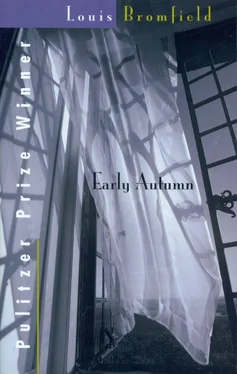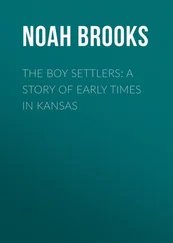Between his teeth he said, “Don’t be a fool, Olivia. … You’re forty years old. …”
“You needn’t remind me of that. Tomorrow I shall be forty. I know it … bitterly. But my being forty makes no difference to you. To you it would be all the same if I were seventy. But to me it makes a difference … a great difference.” She waited a moment, and then said, “That’s the truth, Anson; and it’s the truth that interests me tonight. Let me be free, Anson. … Let me go while being free still means something.”
Perhaps if she had thrown herself at his feet in the attitude of a wretched, shameful woman, if she had made him feel strong and noble and heroic, she would have won; but it was a thing she could not do. She could only go on being coldly reasonable.
“And you would give up all this?” he was saying. “You’d leave Pentlands and all it stands for to marry this cheap Irishman … a nobody, the son perhaps of an immigrant dock laborer.”
“He is the son of a dock laborer,” she answered quietly. “And his mother was a housemaid. He’s told me so himself. And as to all this. … Why, Anson, it doesn’t mean anything to me … nothing at all that I can’t give up, nothing which means very much. I’m fond of your father, Anson, and I’m fond of you when you are yourself and not talking about what a gentleman would do. But I’d give it all up … everything … for the sake of this other thing.”
For a moment his lips moved silently and in agitation, as if it were impossible for him to answer things so preposterous as those his wife had just spoken. At last he was able to say, “I think you must have lost your mind, Olivia … to even think of asking such a thing of me. You’ve lived here long enough to know how impossible it is. Some of us must make a stand in a community. There has never been a scandal, or even a divorce, in the Pentland family … never. We’ve come to stand for something. Three hundred years of clean, moral living can’t be dashed aside so easily. … We’re in a position where others look up to us. Can’t you see that? Can’t you understand such a responsibility?”
For a moment she had a terrible, dizzy, intoxicating sense of power, of knowing that she held the means of destroying him and all this whited structure of pride and respectability. She had only to begin by saying, “There was Savina Pentland and her lover. …” The moment passed quickly and at once she knew that it was a thing she could not do. Instead, she murmured, “Ah, Anson, do you think the world really looks at us at all? Do you think it really cares what we do or don’t do? You can’t be as blind as that.”
“I’m not blind … only there’s such a thing as honor and tradition. We stand for something.”
She interrupted him. “For what?”
“For decency, for a glorious past, for stability … for endless things … all the things which count in a civilized community.”
He really believed what he was saying; she knew that he must have believed it to have written all those thousands of dull, laborious words in glorification of the past.
He went on. “No, what you ask is impossible. You knew it before you asked. … And it would be a kindness to me if you never mentioned it again.”
He was still pale, but he had gained control of himself and his hands no longer trembled; as he talked, as his sense of virtue mounted, he even grew eloquent, and his voice took on a shade of that unction which had always colored the voice of the Apostle to the Genteel and made of him a celebrated and fashionable cleric. Perhaps for the first time since his childhood, since the days when the red-haired little Sabine had mocked his curls and velvet suits, he felt himself a strong and powerful person. There was a kind of fierce intoxication in the knowledge of his power over Olivia. In his virtuous ardor he seemed for a moment to become a positive, almost admirable person.
At length she said quietly, “And what if I should simply go away … without bothering about a divorce?”
The remark shattered all his confidence once more; and she knew that she had struck at the weakest point in all his defense—the fear of a scandal. “You wouldn’t do that!” he cried. “You couldn’t—you couldn’t behave like a common prostitute!”
“Loving one man is not behaving like a common prostitute. … I never loved any other.”
“You couldn’t bring such a disgrace on Sybil, even if you don’t care for the rest of us.”
(“He knew, then, that I couldn’t do such a thing, that I haven’t the courage. He knows that I’ve lived too long in this world.”) Aloud she said, “You don’t know me, Anson. … In all these years you’ve never known me at all.”
“Besides,” he added quickly, “he wouldn’t do such a thing. Such a climber isn’t likely to throw over his whole career by running away with a woman. You’d find out if you asked him.”
“But he is willing. He’s already told me so. Perhaps you can’t understand such a thing.” When he did not answer, she said ironically, “Besides, I don’t think a gentleman would talk as you are talking. No, Anson. … I don’t think you know what the world is. You’ve lived here always, shut up in your own little corner.” Rising, she sighed and murmured, “But there’s no use in talk. I am going to bed. … I suppose we must struggle on as best we can … but there are times … times like tonight when you make it hard for me to bear it. Someday … who knows … there’s nothing any longer to keep me. …”
She went away without troubling to finish what she had meant to say, lost again in an overwhelming sense of the futility of everything. She felt, she thought, like an idiot standing in the middle of an empty field, making gestures.
1
Toward morning the still, breathless heat broke without warning into a fantastic storm which filled all the sky with blinding light and enveloped the whole countryside in a wild uproar of wind and thunder, leaving the dawn to reveal fields torn and ravaged and strewn with broken branches, and the bright garden bruised and battered by hail.
At breakfast Anson appeared neat and shaven and smooth, as though there had been no struggle a few hours before in the drawing room, as if the thing had made no impression upon the smooth surface which he turned toward the world. Olivia poured his coffee quietly and permitted him to kiss her as he had done every day for twenty years—a strange, cold, absent-minded kiss—and stood in the doorway to watch him drive off to the train. Nothing had changed; it seemed to her that life at Pentlands had become incapable of any change.
And as she turned from the door Peters summoned her to the telephone to receive the telegram from Jean and Sybil; they had been married at seven in Hartford.
She set out at once to find John Pentland and after a search she came upon him in the stable yard talking with Higgins. The strange pair stood by the side of the red mare, who watched them with her small, vicious red eyes; they were talking in that curious intimate way which descended upon them at the mention of horses, and as she approached she was struck, as she always was, by the fiery beauty of the animal, the pride of her lean head, the trembling of the fine nostrils as she breathed, the savagery of her eye. She was a strange, half-evil, beautiful beast. Olivia heard Higgins saying that it was no use trying to breed her … an animal like that, who kicked and screamed and bit at the very sight of another horse. …
Higgins saw her first and, touching his cap, bade her good-morning, and as the old man turned, she said, “I’ve news for you, Mr. Pentland.”
A shrewd, queer look came into his eyes and he asked, “Is it about Sybil?”
Читать дальше












